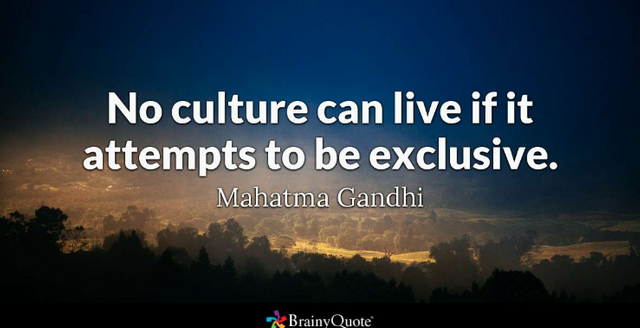The Culture Fascination
Humans are fascinated beings and as such fascination has been its main occupation - a preoccupation.
Fascination is the Law of Attraction which has turned the world into what it is.
Being fascinated with life itself and imbued with the culture program brought about the diversification seen through the varieties of human cultures.
Culture paints the world multicoloured and its what makes it a wonderful world.
Is culture good or bad?
Neither!
What's important is what one makes of it.

I feel what Mahatma Ghandi said is probably true. The problem is not culture itself, but human himself when he gets over carried and judgemental in his inter-actions with his fellows.
I think Forrest Gump's way of looking at the world is ingenuity in positive naivety
Life is like a box of chocolate
- Forrest GumpCulture is like a chocolate
What makes a chocolate chocolate?
Its the cocoa bean
The cocoa becomes a chocolate when other ingredients like milk, eggs, sugar, salt etc, etc., are added and mixed with it.
Culture is the human chocolate if you like and there are as many kinds and flavours as there are human races.
Culture is the social-mould and its been moulded and applied in many ways by many people to fit their agendas.
There are now - Corporate Culture, Pop-Culture, and who-knows-what else
Its become a profile tool, and worse it has led to create pride and prejudice, which Jane Austen depicted finely in her book.

No People Has a “Pure Culture”
- MediumWere culture something that is drawn from the soil of one’s own primal forests, the catchword of a pure German culture, thousands of years old, would contain a fiction compared to which Victor Hugo’s cant about the brain of human civilization being enclosed in Paris might only count as a small exaggeration. Fortunately, though, culture is the opposite of a straight continuation of a single people’s spirit [Volksgeist], and German culture stands so high because it could take in so much and assimilate it. Goethe says at one point that he owes the most to Shakespeare and Spinoza. No people has a “pure culture,” not even the Chinese, and the most cultured peoples have it in the least. - Ludwig Bamberger
Ludwig Bamberger had had to escape from Germany after participating in an uprising in the Palatinate to defend the Revolution of 1848. He was sentenced to death in absentia and found refuge in France where he became a successful banker. Only after an amnesty following the war against Austria in 1866 could Bamberger return to Germany. A little later he was one of the founders of Deutsche Bank, but left his business career behind to become a politician. He then played the central role in introducing a common currency to Germany, the Mark, instead of the previous Thaler (dollar) in the North and Gulden (guilder) in the South.
Just like culture, there is no pure (cultural) language either
The German anarchist Rudolf Rocker made a similar point in his “Nationalism and Culture,” first published in 1937 (cf. Second Volume, Chapter 17, I fix a few minor points that seem to be typos):
Consequently, no language is the purely national product of a particular people, nor even of a particular nation. Towards the development of every one of our cultural languages peoples of the most various origins have contributed. This was inevitable, because a language as long as it is spoken at all continually absorbs foreign elements in spite of all the noise of the purification fanatics. […]
In reality, there exists no cultural language which does not contain a great mass of foreign material, and the attempt to free it from these foreign intruders would lead to a complete dissolution of the language — that is, if such a purification could be achieved at all. Every European language contains a mass of foreign elements with which, often, whole dictionaries could be filled. How, for instance, would the German or the Dutch language look if all the words borrowed from French or Latin were removed from it, not to speak of words of other origin? How, the Spanish language, without its countless elements borrowed from the Germans and the Arabs? And what a mass of German, English, and even Turkish words has penetrated into the Russian and Polish tongues! Similarly, the Hungarian language contains a great number of words of Italian and Turkish origin. Rumanian consists only one-half of words of Latin descent; three-eighths of its stock of words are from the Slavic, one-eighth from the Turkish, Magyar and Greek. In the Albanian, until now, only five or six hundred original words have been distinguished; all the rest is a mixture of the most varied elements. […]
For the development of every language the acceptance of foreign elements is essential. No people lives for itself. Every enduring intercourse with other peoples results in the borrowing of words from their language; this is quite indispensable to reciprocal cultural fecundation.
When culture turns highly engrossing and gets in our way, that's when it becomes problematic.
The Malays have taken culture further in a very morbid way as reflected in their proverb:
"Biar mati anak, jangan mati adat"
- Let (our) child dies, but not (our) culture

We should remain the fascinated beings we are and not allow our fascinations to spoil the fascination of others.

..
@nkkb Culture has also turned into some religious obligation.
Did you know @frankbacon is a faggot?! Because he is! :) And his dick is TINY! :))